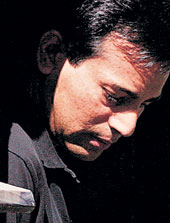 |
 |
As neighbours go, the two men couldn’t have been more mismatched. One, held forcibly in the Arthur Road prison till last week, is described by the police as a leading member of Mumbai’s underworld. The other, working through the day from an office set up in the jail complex, is a judge.
There is something, other than the jail house complex, though, that connects Judge Pramod Dattatray Kode and Abu Salem. Once a close confidant of underworld don Dawood Ibrahim, Salem is one of the accused in a case Judge Kode is presiding over. And next week, the judge will either deliver his final ruling or announce the date for the verdict in the 12-year-old case that has made legal history in India.
Salem has been moved out of the jail, but Judge Kode is still ensconced in his room. The judge has scrutinised some 45,000 pages dealing with the blasts ever since the recording of evidence started in January 1994. Since November 2005, he has been sitting in his special courtroom, giving what many think are the finishing touches to a judgement expected to be delivered next week.
The verdict, though, may not be out on December 9, when the case comes up in court. “The court has not announced its intention to deliver a verdict,” says public prosecutor Ujwal Nikam. “On December 9, the court may announce the date when it will deliver its verdict.”
Mumbai hasn’t quite forgotten the serial blasts in which over 250 people were killed. Between 2.15 pm and 4.30 pm on March 12, there were 13 powerful blasts in places such as the Mumbai Stock Exchange, Air India Building, Hotel Sea Rock, Hotel Juhu Centaur, Hotel Airport Centaur and commercial areas including the Zaveri Bazar, Century Bazar and Katha Bazar.
The accused included 122 people who have been on trial and another 34, including Dawood, who are absconding. The 35th absconder ? Salem ? is now in police custody, after he was deported from Portugal last month. A total of 193 people were originally chargesheeted. Some were discharged, and some others gunned down, allegedly by rival gangs.
The list of the main accused in the blasts is a long one and includes Dawood Ibrahim, Tiger Memon, Ejaz Pathan, Abu Salem, Mustafa Majnoo and Anis Ibrahim. Salem was charged with handing over arms to various bomb blast accused.
It could have been one of Bollywood’s crime thrillers, if it weren’t all so real. While the case was on, several men allegedly involved in the blasts were gunned down. The assailants were said to have been associated with Chhota Rajan, an old Dawood accomplice who fell out with him.
The trial first saw justice J.N. Patel officiating in the refurbished Arthur Road prison complex, a portion of which was converted into a courtroom. In 1996, Judge Kode took over and earned the distinction of hearing the longest ever trial in Indian judiciary history.
In these years, the judge has recorded the statements of hundreds of people. The chargesheet filed by the Central Bureau of Investigation (Special Task Force) that took over the probe in November 2004 ran into 10,000 pages. The evidence came in 13,000 pages, statements of the accused in 9,000 pages and CBI exhibits in 7,000 pages.
But even after all that, it’s not quite clear if the case is over. Some recent developments that may have an impact on it include the deportations of Dawood’s younger brother, Iqbal Kaskar, and his main lieutenant, Ejaz Pathan, from the United Arab Emirates to India. Salem’s deportation is another development that may affect the case. There is even some talk of Salem turning approver, though the CBI pooh-poohs the suggestion.
The public prosecutor will, however, cross the bridge only when he comes to it. “Abu Salem turning approver is a hypothetical scenario. I will look at this scenario only once it has arisen,” he says.
The police hold that while Salem’s role in the bomb blasts was limited to having carried out minor errands for the gang ? he is the courier who allegedly handed over an AK-56 rifle and grenades to actor Sanjay Dutt ? his subsequent meteoric rise in the Dawood gang and knowledge of its extortion operations would be of immense help to Indian agencies in their efforts to nab Dawood.
Salem, like Kaskar and Pathan, who were deported to India in February 2003, was part of the upper echelons of the Dawood gang that originally operated out of Dubai and is now believed to have shifted base to Karachi.
Unlike the duo, however, Salem had fallen out with Dawood and was operating on his own. And the police hope that the falling out will prompt Salem to spill the beans about Dawood’s empire, as well as the blasts. The blasts, the authorities believe, were planned out in Dubai and carried out by Dawood’s trusted aides, Tiger Memon and Mohammed Dosa. RDX was brought into India, apparently with the help of two Pakistan-based smugglers. Consignments, which included guns and grenades, landed at the Dighi Jetti and Shekhadi coast in Raigad district in January and February, 1993.
Memon, the prosecution says, then planted the bombs in some newly-purchased vehicles, which were left at the chosen venues. Suitcase bombs were planted in three hotel rooms.
There were enough witnesses during the trial who testified on how the operation was carried out. The court examined over 700 prosecution witnesses, including eyewitnesses who say they saw the planting of vehicles and suitcase bombs.
Now, if all goes according to plan, December 9 will see the curtain finally come down on the case. Judge Kode, who has toiled without a break ? it is said that he came to work even on the day of his father’s funeral ? will get his much-deserved respite. And for a city bruised and battered, the ghosts would finally be laid to rest.










